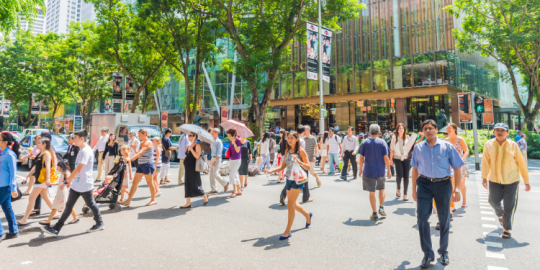Overall, world peace has dropped by 2.38% over the last decade, and by 0.27% from 2017 to 2018. While some improvement have been seen in 71 countries, peace has deteriorated in 92 others for different reasons including tensions, conflict, and crises that have emerged during the past decade and remain unresolved, especially in the Middle East. Internal conflict and terrorism are said to be factors that have the most significant contribution to peace deterioration. From 2006 to 2016, a rise in terrorist activities has been reported in 100 countries. During the same period, there was a 264% increase in conflict-related deaths. On the other hand, contrary to public perception, militarization has improved by 3.2% due to a decrease in military expenditure in 102 countries.
The world's most peaceful nations
Iceland stands out as the world's most peaceful country for the tenth year in a row. Being one of the world's most democratic countries, Iceland is famous for its economic prosperity and political stability, as well as its homogenous nation. Needless to say that Iceland has become a popular expat destination for the past few years. Following Iceland in the top 10 are New Zealand, Austria, Portugal, Denmark, Canada, Czech Republic, Singapore, Japan, and Ireland.
Europe is home to some of the world's most peaceful nations in spite of a slight deterioration over the past few years in three domains: ongoing conflict, security and safety, and militarization, especially in Western Europe. In Eastern Europe, there has been significant improvement, namely in Macedonia, Montenegro, Slovakia, Albania, Croatia, and Romania. Twenty European countries thus come up in the top 30 list of the world's most peaceful countries.
Portuguese, Danes, Slovenes, Swiss, Swedes, and Finns are generally known to be the world's most peaceful nations. North America, on the other hand, owes its fame to Canada which is the 6th most peaceful country in the world while the USA lags far behind, mainly due to its political instability since the 2016 presidential election.
It's also worth noting that Asia-Pacific remains the world's third most peaceful region even though Australia has been ejected from the top 10, with New Zealand ranking 2nd globally. One of the world's most attractive destinations for foreign professionals, Singapore ranks 8th when it comes to peace, followed by Japan (9th). Nineteen Asia-Pacific countries, including Bhutan (19th), Malaysia (25th), Taiwan (34th), Laos and Mongolia (tied at 46th), and South Korea (49th), are now in the top 50.
The world's most dangerous countries
Unsurprisingly, Syria (163rd), remains the world's most dangerous country along with Afghanistan, South Sudan, Iraq, Somalia, and Yemen ranking 162nd, 161st, 160th, 159th and 158th respectively due to a significant deterioration of the political stability and militarisation level. Russia ranks 154th mainly for being involved with Syria, and possible clashes with Western forces. On the other hand, in spite of the European Union's economic sanctions against Russia, President Vladimir Putin still benefits from the strong support of the Russian population, which suggests that the situation is not likely to improve any time soon.
Improvements
Some countries show significant improvements regarding peacefulness over the past year. The Gambia, for example, climbs up 35 places to the 76th spot thanks to progress regarding ongoing conflicts. The April 2017 presidential election led not only to the decentralisation of power but also to the restoration of political stability and steady economic recovery. The Gambia thus ranks as the 15th most peaceful country in Sub-Saharan Africa.
Liberia climbs up 27 places to the 63rd spot globally thanks to improvements in the safety and security and militarisation domains. Moving up from the 62nd to the 53rd spot, Senegal becomes the 10th most peaceful country in Sub-Saharan Africa. Several factors contribute to this improvement, including a drop in terrorism impact and the number of refugees, as well as a slight decrease in the personnel of armed forces.
Deteriorations
Reportedly, Qatar witnessed the most significant deterioration despite being one of the top destinations for expatriates, for various reasons including economic prosperity and the career prospects available there. The country drops from the 30th down to the 56th spot due to ongoing political conflict. However, Qatar remains the third most peaceful nation in the Middle East and North Africa region. Qatar has been suffering from the economic and political boycott by four Arab States, namely Egypt, Saudi Arabia, the United Arab Emirates, and Bahrain. In fact, the country is blamed for setting up policies that have put regional stability at risk.
Dropping down ten places to the 30th spot globally, Spain has also deteriorated over the past year in the global peace index. Two reasons are indicated in this case: an increase in terrorism impact and the deteriorating political environment. You will perhaps recall the 2017 terrorist attack in which 14 people were killed in Barcelona. The following days also witnessed a wave of attacks. Spain has also been hit by internal conflict giving rise to violent demonstrations due to Catalonia's political instability since the October 2017 independence referendum.
Sources :
- Global Peace Index 2018 : https://reliefweb.int/sites/reliefweb.int/files/resources/Global-Peace-Index-2018-2.pdf
















